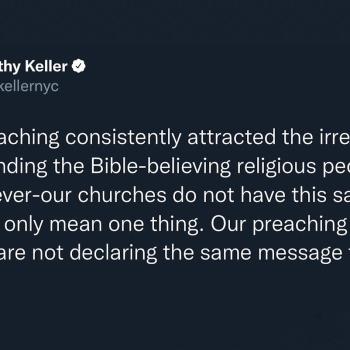The age of the internet has brought on an incredible surge of theologians being given a platform to speak, write, and debate upon. Lest I be completely self unaware, I recognize the writing I am about to propose applies equally to myself (hence why I feel comfortable writing it). Using a broad definition of “theologian” to simply mean anyone who is partaking in thinking about the concept of God – we find ourselves squared with the notion that anyone who possesses breath is a theologian.
Now, it stands to reason that if everyone is a theologian, we have three categories with which we can work: good theologians, poor theologians, and heretics. Logically then, every being is either thinking about the concept of God in a good manner (in orthodoxy), a poor manner (in heterodoxy), or heretical manner (in heresy). Congruently, one is either correct in their concept of God or incorrect – and the severity of their incorrectness places them in either of the two respective camps of theologians who are outside the pale of orthodoxy. Yet the rub is that one of these groups outside the pale of orthodoxy is doomed to an eternity in hell because of the theology they hold. In this same respect, everyone is operating under some creedal system, whether subscribed to firmly, loosely, or not at all (no creed is a creed); what differs, respectively, is if this system is orthodox, heterodox, or heretical.
The Reformers noted that there were three components necessary for a genuine, biblical faith: notitia, assensus, and fiducia.
The notitia is the content, or the “facts” of one’s faith. More clearly, these “facts” are the basic components of the faith, or, what doctrines we need to know that are necessary for salvation. Historically, this has been defined through the teaching of the apostles and has been the subject of many church councils and creedal/confessional statements. This would include doctrines pertaining to each member of the Trinity (Theology Proper, Christology, and Pneumatology) – yet also the doctrine of the Trinity itself. This most clearly is exemplified in the gospel itself, as the body of content in the preaching of the gospel is necessary for one to come to a saving knowledge of the Lord, Jesus Christ. There are other doctrines one must know in order to be saved (such as the deity of Christ, His sinless perfection, the atonement, etc.); this is simply a brief summary to convey the concept of notitia.
The assensus is the belief that the notitia is true. Moreover, it is the ascent to this body of truth, holding that such things which are proclaimed as true by the scriptures are indeed true. This would include holding to such things as true as the Virgin Birth, the Hypostatic Union, etc. In other words, the correct body of truth (the orthodox teaching) is recognized as true and believed as such. One may have the facts, yet remain in unbelief because he/she simply does not ascent to this knowledge as truth. This has been the bane of critical scholars and liberal Christians for years simply in that many can conceptually grasp orthodox teachings – they just deny their truthfulness, and subsequently, deny Christ.
The fiducia is when one has the correct content of that which is necessary for salvation, believes this content to be true, and it actually affects their life as they trust and rely upon it in faith. This is the fruit of one’s faith, such as holy living, repentance, and obeying the commands of scripture. The correct content and the belief in it has personally caused a paradigm shift in their life to reflect that they have been saved. Correct facts and belief are not enough – for even the demons have these, yet they shudder. It is the submission to these truths, as one places their life under the Lordship of Christ and trusts in His redemption, that is found in this component of the faith.
As one can see, these three components are inseparable for the true Christian and they work in conjunction with one another in the salvific process. Yet the one I wish to key in on exclusively here is the notitia, that is, the “facts” of the Christian faith. In particular, this is why I mentioned earlier that one outside the pale of orthodoxy is doomed to an eternity in hell because of the theology they hold. This is also specifically why the title of this piece is so apropos. Simply quoting the bible to support your argument is insufficient for the simple reason that even the heretics in the early church quoted scripture – yet their views were condemned. Thus, one may have a faith of some respect, yet if the content of their faith is false, they don’t believe that which is true, nor does that true content cause them to submit to Christ – do they have a valid faith? Furthermore, can the quoting of scripture really be said to support their life of rebellion to God? Of course not. It is not enough for one to quote the scriptures in support of their faith – the scriptures must be used as they are intended by God in order to support the faith.
We have historical councils which have given us conciliar agreement on orthodox doctrine – not by way of coercion, force, or kingly influence, as many have unfortunately maintained. Instead, we find a diverse group with varying opinions meeting over the course of days, months, and sometimes years, to iron out the content of the scriptures so that the church may operate within the bounds of correct belief – because contrary teaching was rising in the land. While some periods within the history of the church gave rise to more serious inquiry on particular doctrines, we must recognize much of the theology done by the church is reactionary (after all, the canon was closed long before the Eastern and Western church came to full agreement by the 5th century). What I mean by this sentiment is that orthodox theologians are not reinventing the wheel each time they do theology. We’re not looking for further revelation. We’re looking for further insight and greater understanding that is reflected in pure doctrine and devotion to our God. It is for these reasons that much theology has been done on a reactionary basis against those who are trying to reinvent the theological wheel, in order to defend the historic faith handed down to us from the apostles.
Anyone can quote the scriptures to support whatever ideology they hold to. If one so desires, they can quote the scriptures and make an argument in support of Mormonism, the Hebrew Roots movement, being a Jehovah’s Witness, or the oft cited “Muslims and Christians worship the same God” ideology. In that same precise manner, one can quote scripture to support homosexual practice, sex before marriage, pornography, abortion, theft, gossip, slander, backbiting, anger, or any other practice which the scriptures define as sinful and worthy of condemnation. Or perhaps you’ll find yourself embracing a Trinitarian heresy like Modalism, or a works-based salvation, or the cheap grace of antinomianism, or even the prosperity gospel. The simple point being: you can quote-mine the scriptures and make them say whatever you’d like to – but that doesn’t make your concept of God or understanding of doctrine correct. This is why the way we study the bible is so important. This is why the debate on the eternal subordination of the Son was such a large deal among Complementarians (and why Egalitarians weighed in as well).
When you not only deny the context of scripture, but historical orthodoxy, and creedal/confessional statements – you ought to be extremely careful, for you may just find yourself in the camp standing condemned. Yes, the church has been wrong in the past and will be in the future and not all historic councils are one in the same. Yes, there are confessional documents which are not in agreement on some matters and we can contain legitimate disagreements over secondary matters of doctrine. Yes, the bible is the final authority, lest we forget the dark ages in the church when the gospel was completely lost. Yes, the only thing which the Christian can place emphatic trust upon its inerrancy is the bible itself, but your interpretation of the bible is not necessarily the same as the actual teaching thereof. Creeds and confessional agreements are meant to be guardrails for our benefit, yet they are not the final litmus test. While they are not inerrant, they are vital to the life, health, and understanding of the church as they seek to be those abiding in the truth of God.
So, with this being said – go read some (orthodox) dead guys.
Featured Image: Friday Morning by Jona Park; CC 2.0













